Key takeaways:
- Selective mutism is an anxiety disorder affecting children, often leading to feelings of isolation and frustration in social situations.
- Positive reinforcement, through praise and rewards, plays a crucial role in building confidence for those with selective mutism.
- Creating a supportive environment and recognizing small achievements encourages individuals to overcome communication barriers.
- Success stories illustrate the transformative power of consistent encouragement and positive reinforcement in helping individuals find their voice.
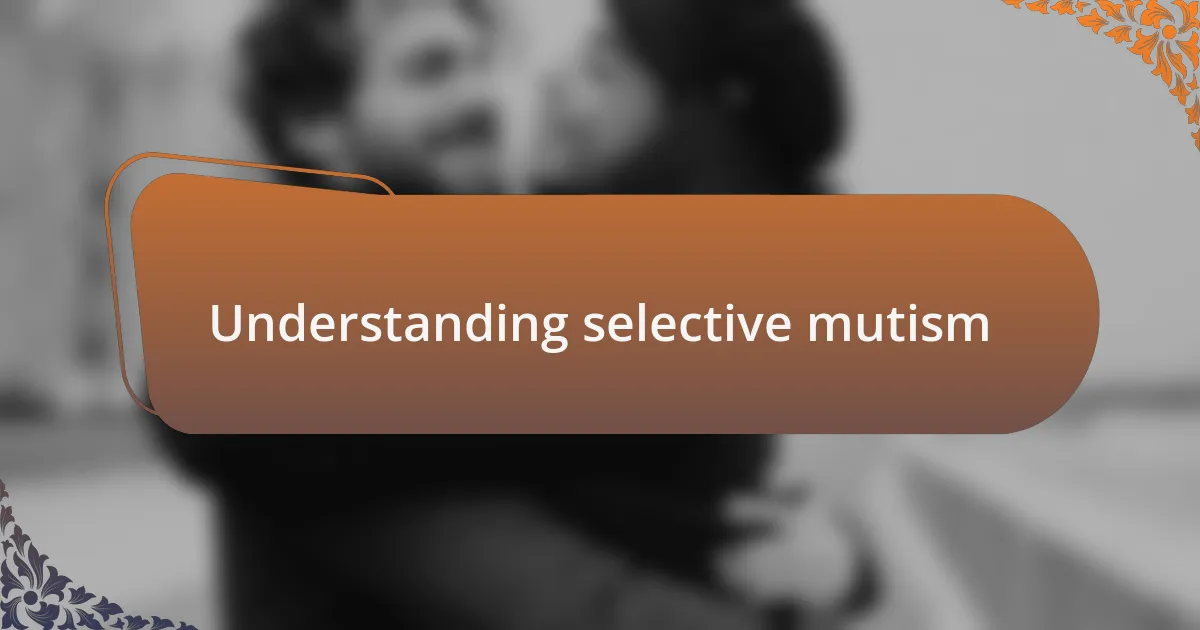
Understanding selective mutism
Selective mutism is more than just refusal to speak; it’s an anxiety disorder that typically affects children. I remember feeling a knot in my stomach just thinking about speaking in class, as if my voice had been locked away. Can you imagine being in a room full of people yet feeling utterly invisible because words just wouldn’t come?
This condition often stems from social anxiety, making certain environments overwhelming for those who experience it. I often found myself quietly observing rather than participating, feeling a mix of frustration and loneliness. Have you ever felt so anxious in a social situation that you just wanted to disappear? That’s what selective mutism feels like, entangling the mind and limiting expression.
Understanding selective mutism requires empathy and patience, as its impact is profound. It can lead to feelings of isolation both for the individual and their loved ones, often creating a barrier to connection. When I think back, I wish I had known that it was okay to take my time finding my voice; perhaps it would have made the journey feel less daunting.
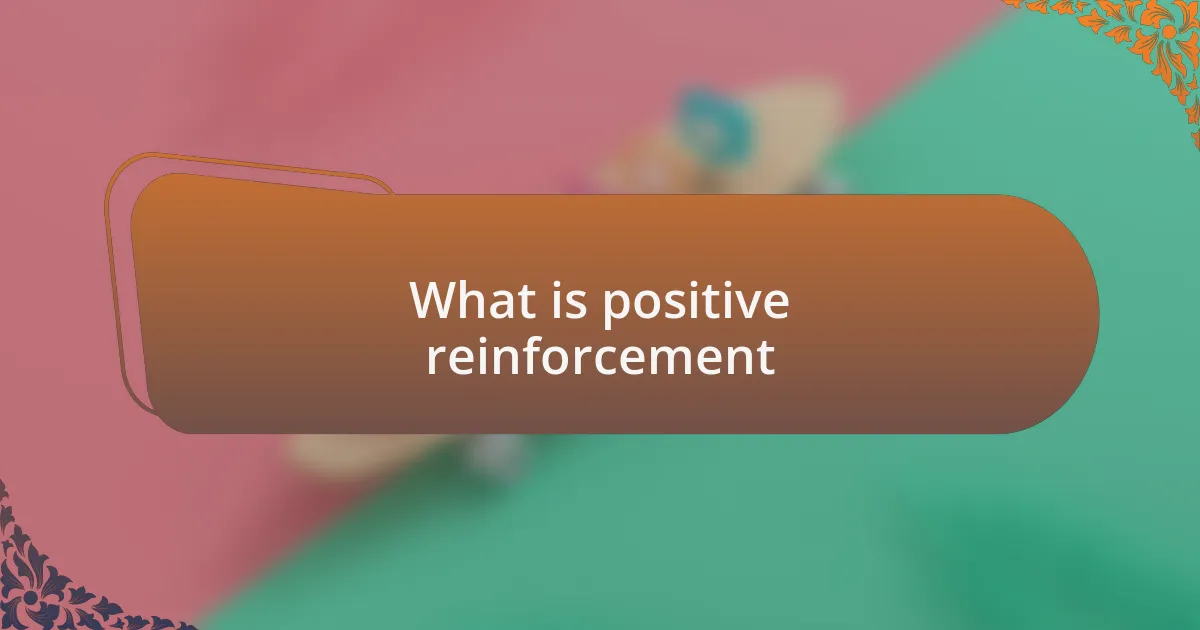
What is positive reinforcement
Positive reinforcement is a strategy that encourages desired behaviors by offering rewards or praise when those behaviors are exhibited. I remember the first time I received positive feedback for speaking up in a small group; it felt like a warm hug of encouragement. Have you ever experienced a moment where a simple compliment sparked a change in your behavior?
In essence, positive reinforcement helps to build confidence and motivation, particularly for those of us navigating challenges like selective mutism. The thrill of hearing someone say, “Great job for sharing your thoughts!” can be life-changing. It’s those small victories that gradually chip away at the anxiety associated with speaking.
I found that when my efforts were acknowledged—no matter how small—I was more willing to engage in conversations. Each positive response became a stepping stone, leading me to embrace social interactions that once felt daunting. Have you noticed how encouragement can shift your perception of a challenging situation? Positive reinforcement has a remarkable way of transforming anxiety into action.
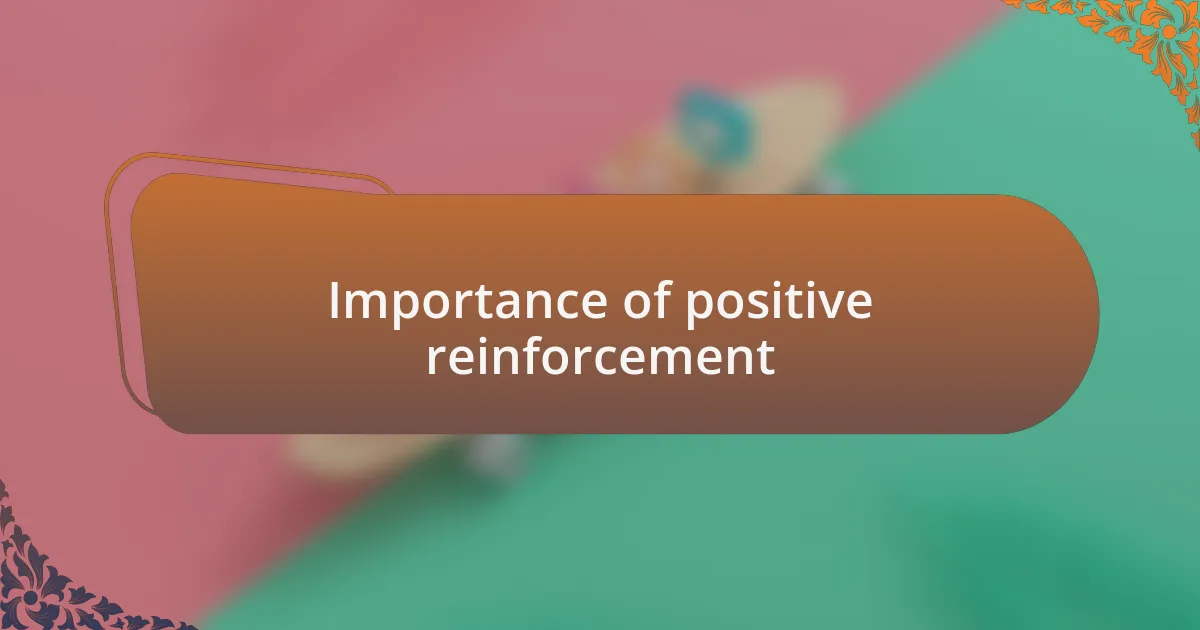
Importance of positive reinforcement
Positive reinforcement is crucial because it actively fosters a nurturing environment where individuals feel valued and understood. I remember a moment when a teacher praised my efforts in sharing a story during an oral assignment. That simple acknowledgment made me want to participate more, turning what felt like a chore into something I looked forward to. Doesn’t it feel uplifting when your efforts are seen and celebrated?
The impact of positive reinforcement goes beyond the immediate praise; it creates a cycle of motivation. For instance, when I received commendation after speaking in a group setting, it sparked a desire within me to challenge myself further. Each positive experience effectively became a building block for my confidence. Can you think of a time when encouragement encouraged you to step outside your comfort zone?
Moreover, the emotional connection formed through positive reinforcement is powerful. I’ve found that when someone recognizes even minor achievements, it reinforces a sense of belonging and safety—essential elements for overcoming selective mutism. It’s fascinating how a few kind words can shift one’s mindset, turning uncertainty into courage. After all, isn’t our ability to communicate heavily influenced by the support we receive from others?
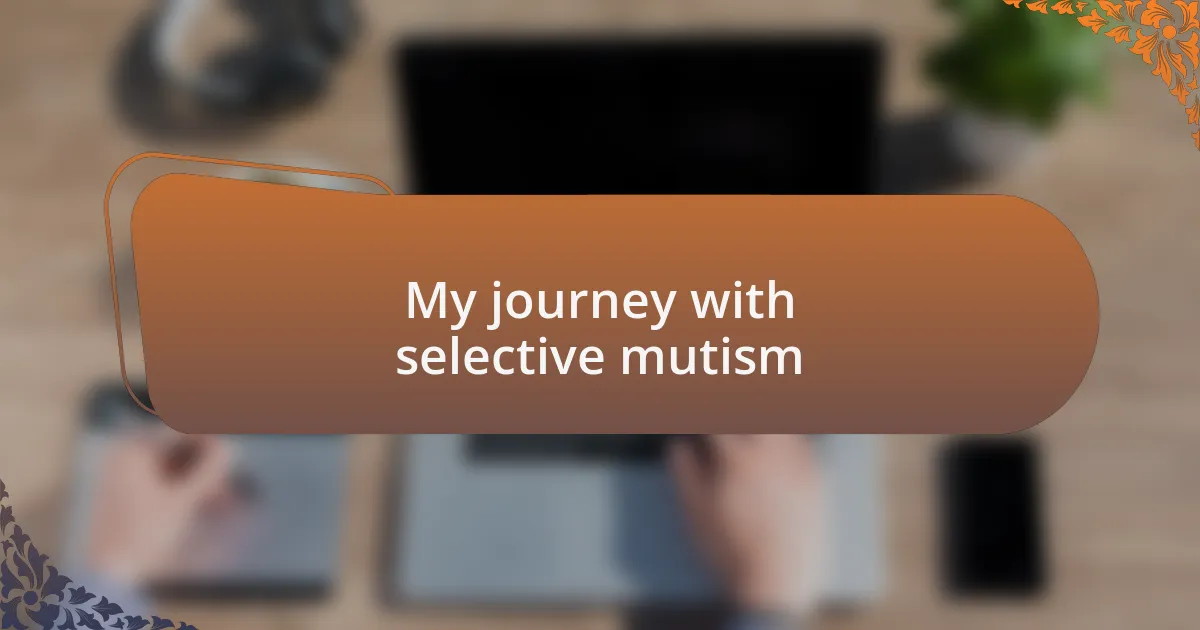
My journey with selective mutism
My journey with selective mutism began at a young age, where silence often felt like my safe cocoon. I remember sitting in the school cafeteria, surrounded by friends but too anxious to speak. It was in those moments of quiet that I learned to communicate through my eyes and smiles, but deep down, I longed for the freedom to voice my thoughts. Have you ever felt the weight of unspoken words?
As time went on, the connections I made through non-verbal communication opened doors. A kind classmate once sat beside me and shared her lunch without expecting a single word in return. That simple act of kindness made me realize that sometimes, understanding transcends speech. In a world where words often seem like the only way to connect, isn’t it powerful when actions can bridge that gap?
Over the years, I slowly began to find my voice again. With each supportive interaction, I could feel my confidence growing, like a small seed pushing through the soil toward the sun. I think back to a moment during a presentation when I stammered but then spotted a friendly face in the audience, silently cheering me on. That small spark of encouragement was everything. Can you recall a moment when a familiar presence gave you the courage to persevere?
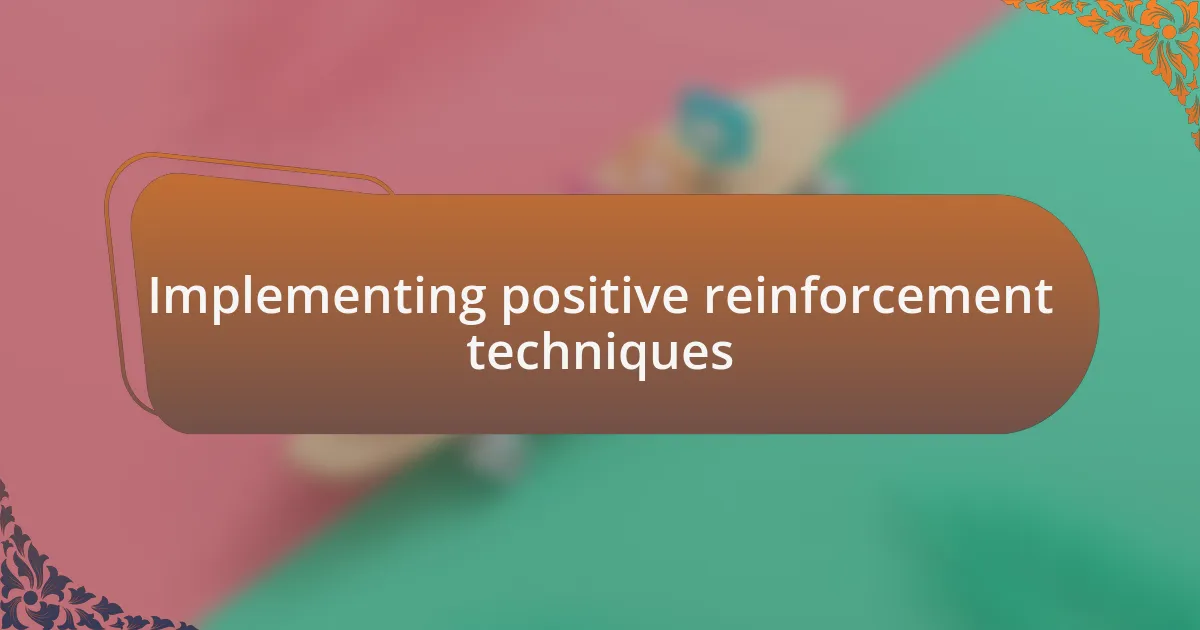
Implementing positive reinforcement techniques
Implementing positive reinforcement techniques can be a powerful tool in supporting those with selective mutism. I remember the first time I received praise for simply whispering “hello” to a classmate. It felt like a small victory, but the genuine smile from my teacher made it clear that this tiny step mattered. Have you ever felt a rush of pride from the simplest acknowledgment?
Creating a reward system can further encourage progress. I recall my parents setting up a chart where I could earn stickers for every time I spoke during social activities. At first, the pressure felt overwhelming, but as the stickers piled up, so did my confidence. It was exciting to see tangible proof of my efforts. Isn’t it amazing how our achievements, no matter how small, can spark a sense of accomplishment?
In ways, it was the little things that mattered most—turning praise into a habit. When my friend began to cheer me on every time I spoke up, I could feel myself blossoming with each encouraging word. The sequence of those moments taught me that every effort deserved recognition. How might our lives change if we celebrated such small victories regularly?
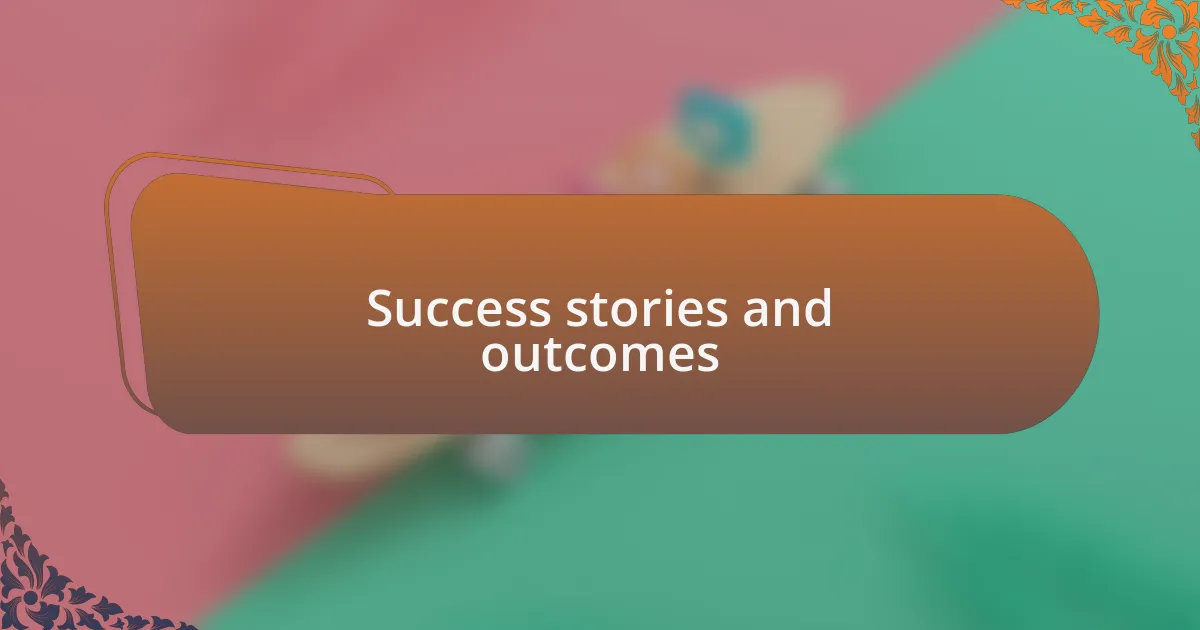
Success stories and outcomes
The success stories of using positive reinforcement in overcoming selective mutism are truly inspiring. I remember a fellow classmate who struggled even more than I did. Through consistent encouragement and a reward system where she could earn small treats for speaking, she gradually found her voice. Seeing her light up when she successfully ordered her own lunch was a moment I’ll never forget. How incredible is it that a simple smile and a small reward can spark such significant change?
Another outcome that struck me was when a friend began sharing her progress on social media. With each post, she celebrated her milestones, like initiating conversations or speaking in class. It was incredibly motivating to witness how her confidence grew, and I often found myself reflecting on my own journey. Have you ever found inspiration in someone else’s successes?
Consistency in positive reinforcement really does lead to remarkable outcomes. I can vividly recall the time I spoke up in a group setting without feeling paralyzed by anxiety. The cheers and applause from my peers were more than just noise; they were validation of my hard work. In that moment, I realized that every small step taken towards overcoming selective mutism is worth recognizing—how might we continue to support one another in celebrating these wins?
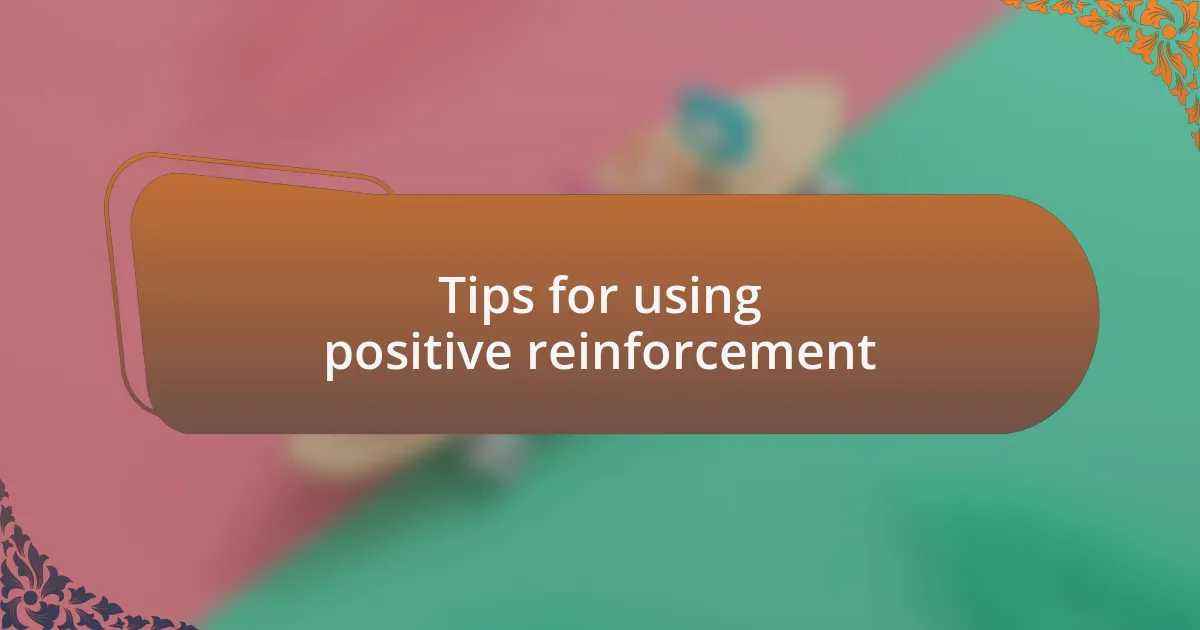
Tips for using positive reinforcement
Using positive reinforcement effectively can enhance confidence in various situations. For instance, I remember setting up a small reward system for myself, where I would enjoy a favorite snack after initiating a conversation. This simple act not only motivated me to speak but also transformed what felt like a daunting task into an opportunity for enjoyment. Have you ever noticed how a little incentive can make a challenging task feel more manageable?
It’s also crucial to personalize rewards to ensure they resonate. I found that offering myself experiences—like a walk in the park after speaking in class—felt more rewarding than tangible items. This personal touch added an emotional connection to the achievement, making each small success feel monumental. What types of rewards do you think would resonate most with your experiences?
Lastly, don’t underestimate the power of verbal praise. When I received encouraging words from friends or teachers after overcoming a speaking challenge, it validated my efforts in a way that tangible rewards couldn’t. The excitement in their tone made me feel proud of my progress. How often do we pause to recognize and celebrate each other’s successes in our journeys?